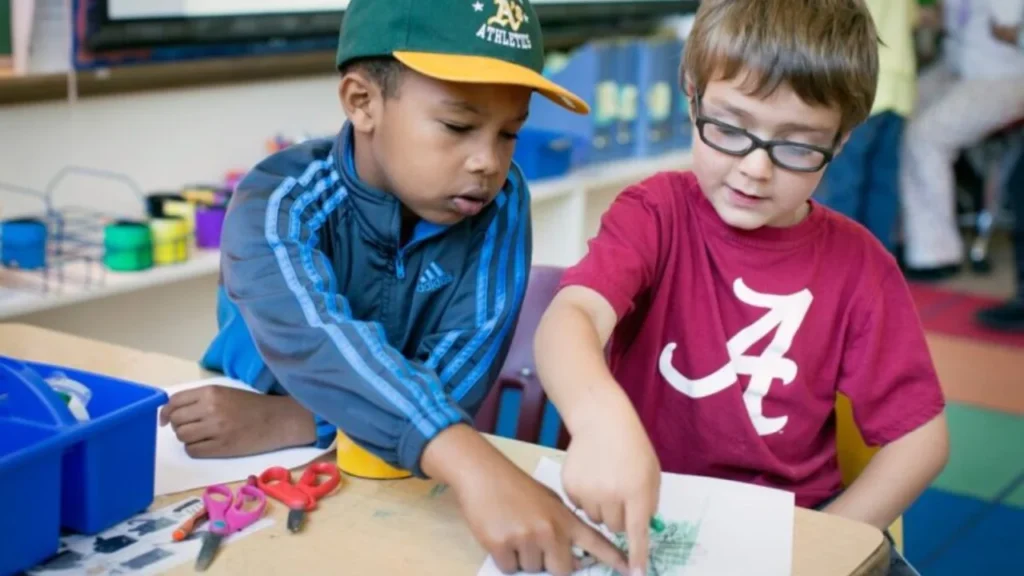![Hermitage Hills Day School: 5 Powerful Ways Playtime Sparks Lifelong Learning Introduction: The Enduring Impact of Play in Early Education Play is not a temporary indulgence—it is a lifelong tool for growth. At Hermitage Hills Day School, this philosophy forms the […]](https://dayschools.org/hermitage/wp-content/uploads/sites/5/2025/05/Day-School-1.webp)
Table of Contents
Introduction: The Enduring Impact of Play in Early Education
Play is not a temporary indulgence—it is a lifelong tool for growth. At Hermitage Hills Day School, this philosophy forms the cornerstone of an educational model where play is purposefully embedded into daily learning. The institution challenges antiquated notions that equate learning with rigidity and instead embraces a pedagogy that views play as an indispensable agent of cognitive, emotional, and social advancement.
Children at Hermitage Hills Day School are immersed in a dynamic environment where joyful exploration is intrinsically tied to educational outcomes. Whether through imaginative storytelling, collaborative building tasks, or sensory discovery, each experience is laced with intentional learning objectives. The school’s educators understand that meaningful play is neither chaotic nor frivolous—it is structured, scaffolded, and richly developmental.
This reimagining of play as a foundational element of education ensures students don’t merely memorize facts—they internalize understanding through active engagement. In this space, learning becomes more than content acquisition; it becomes a transformational process. As children play, they develop frameworks for problem-solving, social negotiation, and resilience that endure far beyond the early years.
Hermitage Hills Day School’s approach exemplifies how the marriage of pedagogy and play creates fertile ground for lifelong learning. This vision prepares children not only for the next academic challenge but for a lifetime of thinking, connecting, and creating with purpose.
Brain Development and Neuroplasticity: The Scientific Basis for Play
Scientific advancements have illuminated what educators at Hermitage Hills have long understood intuitively—play activates and shapes the architecture of the developing brain. During early childhood, the brain undergoes a profound period of neuroplasticity, forming synaptic connections at a pace unrivaled in later life. Play is the catalyst that triggers this neural construction.
Activities involving problem-solving, symbolic thought, and sensory exploration stimulate key brain regions, including the prefrontal cortex and hippocampus. These areas are responsible for attention regulation, memory encoding, and executive function. Through play-based experiences, such as building intricate structures or engaging in role-play, children activate multiple neural pathways simultaneously, reinforcing cognition with each joyful iteration.
Educators at Hermitage Hills Day School design schedules that align with developmental windows—times when the brain is especially receptive to specific skills. The result is a curriculum synchronized with biological readiness, enhancing both the absorption and application of knowledge. Movement-rich and curiosity-driven environments serve not just to entertain but to construct cognitive infrastructure.
This neuroscientific grounding affirms that play is not ancillary—it is elemental. By leveraging the brain’s natural inclination toward learning through action, Hermitage Hills Day School ensures its students develop not only intellectual capacity but mental adaptability, which is essential in an ever-evolving world.

The Social Laboratory: Building Relationships Through Play
Human interaction is a sophisticated art form, and the early years are when its most foundational brushstrokes are made. At Hermitage Hills Day School, the playground becomes a living laboratory where social dynamics are explored, tested, and refined. In scenarios ranging from spontaneous make-believe to carefully facilitated group games, children learn to navigate the nuances of collaboration, empathy, and communication.
The power of structured social play lies in its naturalism. Unlike didactic lessons in manners or cooperation, play allows children to experience real consequences—both rewarding and corrective—within the safety of supportive supervision. When disputes arise over roles in a game or how to share materials, students must engage in negotiation, compromise, and at times, conflict resolution.
Educators subtly guide these interactions, offering reflective questions and modeling positive behavior. This scaffolding allows children to internalize social norms and moral reasoning. More importantly, it grants them autonomy in applying those insights, cultivating interpersonal competence that is deeply rooted rather than superficially instructed.
As children grow in their social awareness, they also develop leadership qualities. They learn to listen, mediate, inspire, and follow when appropriate. These early forays into group dynamics lay the groundwork for collaborative success in school, work, and community settings for decades to come.
Expressive Language and Communication Growth
Language acquisition thrives in context-rich, interactive settings. At Hermitage Hills Day School, play is the primary conduit through which linguistic capabilities are nurtured. Each playful exchange—be it a puppet show, a kitchen role-play, or a storytelling session—is a stage upon which vocabulary, syntax, and expressive nuance are rehearsed and refined.
Children are constantly exposed to new terms in meaningful contexts, which enhances both retention and usage. Educators skillfully introduce advanced language during play, modeling correct grammar and expressive phrasing in ways that feel organic rather than instructional. Thematic play centers are updated regularly to ensure vocabulary expansion aligns with evolving interests and developmental stages.
Dialogue among peers is especially potent in building communicative confidence. Unlike scripted classroom responses, conversational play demands creativity, adaptability, and listening skills. Children must interpret verbal and non-verbal cues, adjust tone based on context, and engage in back-and-forth exchanges that mirror real-world communication.
Beyond language mechanics, these experiences foster narrative thinking—the ability to construct, follow, and communicate stories. This skill not only supports literacy development but also enhances comprehension, memory, and imagination. Through play, Hermitage Hills students don’t just learn to speak; they learn to connect meaningfully through language.
Resilience and Risk: How Play Shapes Emotional Strength
Resilience is not bestowed—it is built. At Hermitage Hills Day School, children are encouraged to take manageable risks within play-based settings, cultivating emotional stamina, perseverance, and self-regulation. This might look like attempting a new climbing apparatus, tackling an unfamiliar game, or navigating a disagreement with a friend.
These moments of uncertainty, when supported by nurturing educators, allow children to confront discomfort and emerge stronger. Mistakes are reframed as valuable information, and failure is viewed as a stepping stone rather than a stopping point. This mindset encourages a sense of agency and internal motivation, critical for lifelong learning.
Emotional intelligence is honed in these environments. Children learn to identify and articulate feelings, recognize emotions in others, and respond with empathy. Educators help students process setbacks constructively, using techniques like guided reflection and affirming feedback. This ensures that emotional challenges do not become impediments, but catalysts for growth.
Ultimately, play provides the ideal venue for developing grit—a trait increasingly recognized as a predictor of success. At Hermitage Hills Day School, resilience is not taught through lectures; it is earned through climbing, negotiating, adapting, and trying again. The emotional muscle built through these experiences fortifies children for both academic demands and life’s unpredictable currents.

Cultivating Executive Function through Problem-Solving Games
Executive function skills—working memory, cognitive flexibility, and self-control—are the brain’s command center. These critical faculties are sharpened through strategic play at Hermitage Hills Day School. From logic puzzles to role-based simulations, students are challenged to plan ahead, manage impulses, and adjust to shifting rules.
Board games and collaborative challenges are particularly effective. They require children to hold multiple pieces of information in mind, anticipate others’ actions, and respond strategically. These moments stretch their mental elasticity, allowing them to transition more fluidly between tasks and thought processes.
Educators scaffold these experiences by progressively increasing complexity. For example, a simple sorting game may evolve into a multi-step pattern recognition challenge. Through each iteration, children gain confidence in their cognitive capacity while learning to regulate frustration, delay gratification, and stay focused despite distractions.
This executive training pays dividends in traditional academic settings. Students who regularly engage in such cognitively rich play demonstrate higher levels of task persistence, organization, and independent learning. At Hermitage Hills Day School, executive function isn’t merely a buzzword—it’s a cultivated asset rooted in playful exploration.
Physical Play and Its Link to Academic Readiness
Movement is a language of its own, and at Hermitage Hills Day School, it is fluently spoken. Physical play is interwoven with academic preparation, helping students regulate attention, build stamina, and integrate sensorimotor experiences essential for learning. It is far more than recess—it is rigor through motion.
Gross motor activities like climbing, dancing, and running help develop the vestibular system, which in turn supports balance and spatial awareness—both key to sitting still, focusing, and handwriting. Fine motor play, involving manipulation of small objects, hones hand-eye coordination and muscular control needed for early literacy and numeracy.
Physical activity also enhances neural connectivity. When children move rhythmically or engage in cross-lateral motion, they activate both hemispheres of the brain. This bi-hemispheric stimulation is directly linked to improved memory, concentration, and problem-solving abilities.
Incorporating movement into learning is not optional—it’s essential. The educators at Hermitage Hills Day School understand this deeply and ensure that every child’s body and brain are engaged in concert, setting the stage for holistic academic readiness.
Intentional Teaching in Play-Based Environments
Play at Hermitage Hills Day School is not left to chance. It is carefully curated, observed, and extended by teachers who act as facilitators of discovery. Through guided questioning and timely interventions, educators turn fleeting moments of curiosity into lasting learning experiences.
Teachers observe how students engage with materials, identifying opportunities to deepen understanding or redirect focus. They may ask open-ended questions like, “What happens if you try it this way?” or “Can you explain your thinking?” These prompts encourage metacognitive awareness, inviting children to think about their own learning processes.
This approach allows children to remain the drivers of their experiences while benefiting from expert guidance. Teachers refrain from over-directing, instead offering just enough support to challenge without overwhelming. This balance fosters independence and deep engagement.
In essence, play becomes a collaborative journey between child and educator. It is within these interactions that academic concepts, personal discovery, and critical reflection merge—producing not just knowledge, but wisdom.
The Design of Learning Spaces – Play with Purpose
At Hermitage Hills Day School, learning spaces are more than backdrops for activity—they are co-educators. The design of the environment reflects a sophisticated understanding of how spatial dynamics influence behavior, engagement, and cognitive development. Every corner, texture, and furnishing has a purpose: to awaken curiosity, promote autonomy, and enable deep learning. In this ecosystem, the physical space does not just support education—it actively shapes it.
Accessibility and order are central to the design. Materials are displayed at child-height and rotated frequently to ensure novelty and sustained interest. Open shelves, labeled bins, and natural boundaries help children make independent choices while fostering a sense of responsibility and spatial awareness. The environment becomes a mirror of the school’s educational values—structured, yet flexible; inviting, yet intentional. This sense of ownership over space encourages students to explore confidently and to engage with tasks on their own terms.
Natural materials and biophilic design principles are thoughtfully incorporated throughout the school. Wooden blocks, woven rugs, live plants, and tactile, nature-inspired elements provide both aesthetic richness and emotional grounding. These sensory details do more than beautify—they regulate, calm, and inspire. Research supports what Hermitage Hills Day School enacts daily: that environments rich in natural textures and soothing stimuli promote cognitive clarity and emotional well-being.
In essence, the learning spaces at Hermitage Hills Day School function as a silent but powerful guide. The layout communicates expectations—where to explore, when to reflect, how to collaborate—without overt instruction. Routines are supported by the predictability of the space, while creativity is unleashed by its openness and adaptability. The result is a harmonious fusion of design and pedagogy that empowers children to learn not only from teachers and peers but from the very walls, objects, and light that surround them. It is here, in these thoughtfully composed spaces, that the invisible architecture of lifelong learning quietly takes shape.

Parent-School Synergy: Reinforcing Play at Home
Hermitage Hills Day School views parents as integral collaborators in the learning process. The school actively nurtures this partnership through regular communication, enrichment workshops, and home learning extensions designed to mirror classroom experiences.
Parents receive tailored guidance on how to extend play-based learning at home, from curated book lists and conversation prompts to activity kits aligned with current classroom themes. This continuity bridges the gap between school and home, offering children a seamless learning journey.
Family events and collaborative projects further solidify this connection. Whether attending a literacy night or participating in a joint art exhibit, parents become visible and valued contributors to their child’s education. These shared experiences not only reinforce learning but deepen the bond between school and family.
This synergistic model ensures that the child’s developmental momentum is not confined to school hours. It becomes a way of life—rooted in curiosity, nurtured by relationships, and driven by shared purpose.
Conclusion: Play as the Architecture of Lifelong Learning
At Hermitage Hills Day School, the philosophy that play is the architecture—not merely a preface—of learning is not rhetorical flourish; it is lived reality. Within every classroom corner, garden path, and imaginative nook, there exists a vibrant network of opportunities for inquiry, self-discovery, and engagement. These aren’t passive experiences but meticulously designed interactions that align with how children naturally explore the world. The educators understand that the foundation for enduring knowledge is laid not through rote instruction, but through active, embodied, and joyful learning.
Purposeful play at Hermitage Hills Day School is a rigorous endeavor cloaked in delight. Whether a child is building a bridge from blocks, dramatizing a story with peers, or solving a pattern-based riddle, they are strengthening neural pathways and cultivating adaptive behaviors. These moments may seem simple, but they are rich with complexity. They develop the scaffolding for higher-order thinking, decision-making, and interpersonal awareness—skills that extend well beyond preschool or primary education. In this context, play is not a soft skill; it is a strategic investment in the child’s full potential.
What distinguishes the school’s model is its commitment to integrating emotional, social, and intellectual growth into every learning experience. By embedding these dimensions within play, Hermitage Hills Day School allows children to learn in ways that are authentic, relevant, and emotionally resonant. The learning is not isolated to a single subject area or time of day. Instead, it weaves through every interaction and setting, affirming that the capacity to learn is ever-present when environments are responsive, inclusive, and inspiring.
This holistic embrace of play as a driving force for development ensures that graduates of Hermitage Hills Day School leave not only with the academic competencies needed to succeed but with a fortified sense of self, compassion for others, and a deep-seated love for learning. These are the hallmarks of individuals prepared to contribute meaningfully to their communities, adapt to a changing world, and live with both purpose and passion. By shaping the daily rhythm of education around intentional play, Hermitage Hills Day School is doing more than preparing students for the next grade—it is laying the groundwork for thoughtful, lifelong learners.







Leave a Reply